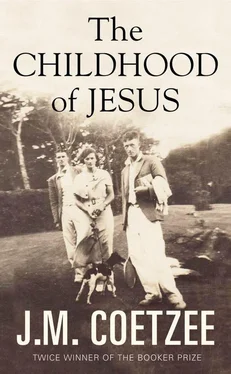Álvaro steps forward, throws a brawny arm around him. ‘Heroic feats of labour won’t be necessary, my friend,’ he says. ‘We know where your heart is, you do not need to prove yourself.’ And other men come up too to clap him on the back or give him a hug. He smiles at all and sundry; tears come to his eyes; he cannot stop smiling.
‘You have not seen our main storehouse yet, have you?’ says Álvaro, still gripping his hand.
‘No.’
‘It is an impressive facility, if I say so myself. Why not pay it a visit? You can go right now, if you like.’ He turns to the driver, hunched on his seat waiting for the stevedores’ debate to be over. ‘Our comrade can ride with you to the storehouse, can’t he? Yes, of course he can. Come!’ — he helps him clamber up beside the driver — ‘Maybe you will appreciate our work better once you have had a sight of the storehouse.’
The storehouse is further from the wharves than he had expected, on the south bank at the bend where the river begins to narrow. At an ambling pace — the driver has a whip but does not use it, merely clucking to the horses now and then to encourage them — it takes them the best part of an hour to get there, time during which not a word is said.
The storehouse stands alone in a field. It is vast, as big as a football pitch and as high as a two-storey house, with great sliding doors through which the loaded dray passes with ease.
The working day seems to be over, for there is no crew to do the unloading. While the driver manoeuvres the dray beside the loading platform and sets about unharnessing the horses, he wanders deeper into the great building. Light filtering through gaps between wall and roof reveals sacks stacked metres high, mountain upon mountain of grain stretching back into the dark recesses. Idly he tries to do the computation, but loses track. A million sacks at least, perhaps several million. Can there be enough millers in Novilla to mill all this grain, enough bakers to bake it, enough mouths to consume it?
There is a dry crunch underfoot: spilled grain. Something soft bumps against his ankle, and involuntarily he kicks out. A squeal; all of a sudden he is aware of a subdued whispering all around him, like the noise of flowing water. He utters a cry. The floor around him is heaving with life. Rats! There are rats everywhere!
‘There are rats all over the place!’ he calls out, hurrying back, confronting the drayman and the gatekeeper. ‘There is grain all over the floor, and you have a plague of rats! It’s appalling!’
The two exchange a glance. ‘Yes, we certainly have our share of rats,’ says the gatekeeper. ‘Mice too. More than you can count.’
‘And you do nothing about it? It’s insanitary! They are nesting in the food, contaminating it!’
The gatekeeper shrugs. ‘What do you want us to do? Where you have grain you have rodents. That is how the world is. We tried bringing in cats, but the rats have grown fearless, and there are too many of them anyway.’
‘That’s not an argument. You could set traps. You could lay down poison. You could fumigate the building.’
‘You can’t pump poisonous gases into a food store — have some sense! And now, if you don’t mind, I need to lock up.’
First thing next morning he raises the matter with Álvaro. ‘You boast about the storehouse, but have you ever been there yourself? It is crawling with rats. What is there to be proud of in working to feed a host of vermin? It is not just absurd, it is insane.’
Álvaro bestows on him a benign and infuriating smile. ‘Wherever you have ships you have rats. Wherever you have warehouses you have rats. Where our species flourishes rats flourish too. Rats are intelligent creatures. You might say they are our shadow. Yes, they consume some of the grain we offload. Yes, there is spoilage in the warehouse. But there is spoilage all along the way: in the fields, in the trains, in the ships, in the warehouses, in the bakers’ storerooms. There is no point in getting upset about spoilage. Spoilage is part of life.’
‘Just because spoilage is part of life does not mean we cannot fight against it! Why store grain by the ton, by the thousands of tons, in rat-infested sheds? Why not import just enough for our needs, from one month to the next? And why can’t the whole trans-shipment process be more efficiently organized? Why do we have to use horses and carts when we could use trucks? Why does the grain have to come in bags and be lugged on the backs of men? Why can’t it just be poured into the hold at the other end, and pumped out at this end through a pipe?’
Álvaro reflects at length before he replies. ‘What do you think would become of us all, Simón, if the grain were pumped en masse as you propose? What would become of the horses? What would become of El Rey?’
‘There would no longer be work for us here at the docks,’ he replies. ‘That I concede. But instead we would find jobs assembling pumps or driving trucks. We would all have work, just as before, only it would be a different kind of work, requiring intelligence, not just brute strength.’
‘So you would like to liberate us from a life of bestial labour. You want us to quit the wharves and find some other kind of work, where we would no longer be able to hoist a load onto our shoulders, feeling the ears of grain in the bag shift as they take the shape of our body, hearing their rustle, where we would lose touch with the thing itself — with the food that feeds us and gives us life.
‘Why are we so sure we need to be saved, Simón? Do you think we live the lives of stevedores because we have been found too stupid to do anything else — too stupid to assemble a pump or drive a truck? Of course not. You know us by now. You are our friend, our comrade. We are not stupid. If we had needed to be saved, we would have saved ourselves by now. No, it is not we who are stupid, it is the clever reasoning you rely on that is stupid, that gives you the wrong answers. This is our dock, our wharf — right?’ He glances left and right; the men murmur their approval. ‘There is no place for cleverness here, only for the thing itself.’
He cannot believe his ears. He cannot believe that the person spouting this obscurantist nonsense is his friend Álvaro. And the rest of the crew seems to be marshalled solidly behind him — intelligent young men with whom he every day discusses truth and appearance, right and wrong. If he were not fond of them he would simply walk away — walk away and leave them to their futile labours. But they are his comrades whom he wishes well, whom he owes the duty of trying to convince that they are following the wrong path.
‘Listen to yourself, Álvaro,’ he says. ‘ The thing itself . Do you think the thing remains forever itself, unchanging? No. Everything flows. Did you forget that when you crossed the ocean to come here? The waters of the ocean flow and in flowing they change. You cannot step twice into the same waters. As the fish live in the sea, so we live in time and must change with time. No matter how firmly we may pledge ourselves to follow the venerable traditions of stevedoring, we will in the end be overtaken by change. Change is like the rising tide. You can build barriers, but it will always seep in through the chinks.’
The men have by now closed in to form a half-circle around Álvaro and him. In their bearing he can detect no hostility. On the contrary, he feels he is being quietly urged on, urged to make his best case.
‘I am not trying to save you,’ he says. ‘There is nothing special about me, I claim to be no one’s saviour. Like you I crossed the ocean. Like you I bring no history with me. What history I had I left behind. I am simply a new man in a new land, and that is a good thing. But I have not let go of the idea of history, the idea of change without beginning or end. Ideas cannot be washed out of us, not even by time. Ideas are everywhere. The universe is instinct with them. Without them there would be no universe, for there would be no being.
Читать дальше












